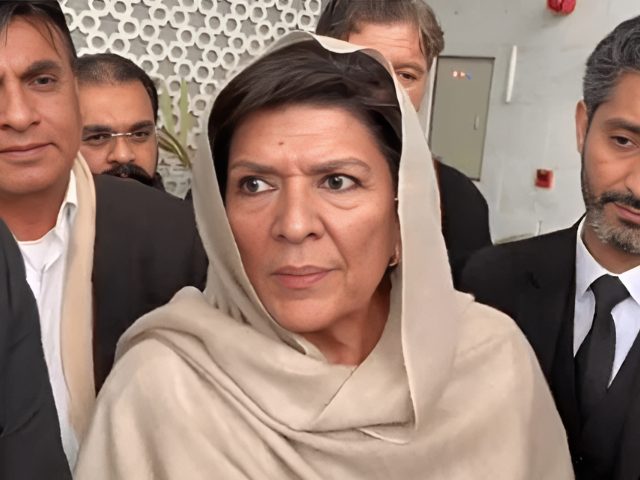In recent weeks, explosive evidence has surfaced exposing a troubling undercurrent within Pakistan’s political landscape. Leaked WhatsApp messages attributed to Aleema Khan, sister of Pakistan Tehreek-e-Insaf (PTI) founder Imran Khan, have sent shockwaves across the political spectrum.
These messages not only highlight a blatant attempt by Aleema Khan to consolidate power within the party but also unveil a deeper narrative of factionalism, manipulation, and dynastic politics undermining PTI’s foundational ethos.
At the heart of the controversy lies Aleema Khan’s strategic exploitation of her brother’s imprisonment. In the leaked messages, Aleema is seen directing her social media operator, Ahsan Alvi, to craft narratives that would amplify her influence while deliberately painting a grim picture of Imran Khan’s prison conditions.
One particularly shocking statement reads, “Why should we get air conditioning and a large room for IK in jail to make the situation seem normal? People need to feel the pain, which will not happen by giving him a fridge, AC, or painting the room.” This cold, calculated approach underscores a disturbing willingness to manipulate public sentiment for personal gain.
Aleema’s use of her brother’s predicament as a political tool raises important questions about the ethical boundaries of leadership. Instead of rallying the party to advocate for justice, the messages suggest an intent to prolong Imran Khan’s imprisonment, leveraging his absence to cement her authority. This strategy is not only self-serving but also emblematic of a larger issue: the creeping shadow of dynastic politics within PTI.
The leaked conversations further reveal Aleema Khan’s disdain for several prominent party figures, including Mashal Yousafzai and Sher Afzal Marwat. In one instance, Aleema refers to Mashal Yousafzai as running her “three ministries from Adiala Jail,” sarcastically questioning her influence. The messages suggest a concerted effort to restrict Mashal’s access to Imran Khan and celebrate her removal from the position of advisor to the Chief Minister of Khyber Pakhtunkhwa.
Similarly, Aleema’s remarks about Sher Afzal Marwat’s illness border on mockery, highlighting a pattern of targeting party members perceived as obstacles to her ambitions. By fostering division within PTI’s ranks, Aleema appears to be pursuing a divide-and-rule strategy that prioritizes personal power over party unity. Political analysts have aptly noted that such tactics are antithetical to PTI’s original mission of challenging entrenched political dynasties and promoting merit-based governance.
Perhaps the most damning aspect of these leaks is Aleema Khan’s attempt to construct a narrative linking state institutions to a fictional virus, dubbed “GHQ 420.” By indulging in anti-state rhetoric, she risks alienating PTI’s core supporters while providing ammunition to the party’s detractors. Her actions betray a willingness to jeopardize PTI’s credibility for personal gain, further eroding the party’s claim to moral high ground.
Moreover, the messages reveal an ongoing power struggle between Aleema Khan and Bushra Bibi, Imran Khan’s wife. Aleema’s directive to Ahsan Alvi to blame Bushra for Imran’s legal troubles is a calculated move designed to tarnish Bushra’s reputation and weaken her standing within the party. This internal discord not only undermines PTI’s cohesion but also paints a grim picture of the personal rivalries that have come to define its leadership.
These revelations underscore a troubling reality: PTI, once a beacon of hope for those disillusioned with Pakistan’s dynastic political culture, is now grappling with its own identity crisis. Aleema Khan’s maneuvers represent a stark departure from the party’s founding principles, which championed transparency, accountability, and meritocracy. Her actions risk alienating PTI’s support base, many of whom joined the movement to reject the very kind of politics she now embodies.
The leaked messages have also reignited the debate over Imran Khan’s leadership and his ability to rein in factionalism within his ranks. As the party’s founder and spiritual leader, Imran Khan bears the ultimate responsibility for addressing these internal divisions. However, his imprisonment complicates matters, leaving a power vacuum that figures like Aleema Khan are eager to fill.
The evidence presented in these leaks is a wake-up call for PTI and its supporters. As the party navigates this turbulent chapter, it must confront the uncomfortable truths about its internal dynamics and recommit to its founding principles. Allowing personal ambitions to overshadow the greater good will only hasten PTI’s decline, eroding the trust and hope it once inspired among millions of Pakistanis.
For Aleema Khan, the path forward should involve introspection and a reevaluation of her role within PTI. Leadership is not about consolidating power at any cost but about serving the people and upholding the values that form the bedrock of any political movement. If PTI is to survive and thrive, it must rise above the shadow of dynastic politics and reaffirm its commitment to the ideals that first captured the nation’s imagination.


